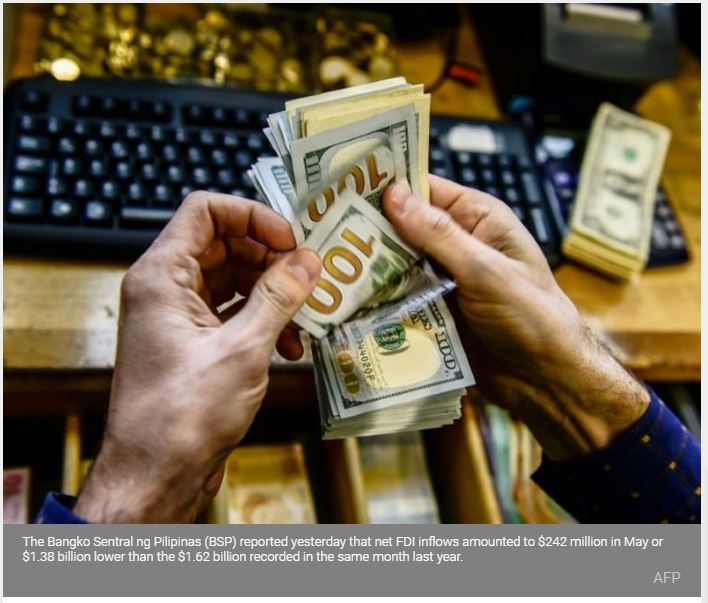Philippines: FDI inflows plunge to 3-year low in May
MANILA, Philippines — Net inflows of foreign direct investments (FDI) plunged 85 percent in May, hitting its lowest level in more than three years, amid external headwinds wherein emerging markets remain affected by the trade war between the US and China.
The Bangko Sentral ng Pilipinas (BSP) reported yesterday that net FDI inflows amounted to $242 million in May or $1.38 billion lower than the $1.62 billion recorded in the same month last year.
This was the lowest net FDI inflows since the $238 million recorded in June 2016.
The BSP attributed the decline to the 88.6 percent fall in non-residents’ investments in debt instruments consisting mainly of loans extended by parent companies abroad to their local affiliates to $149 million from $1.3 billion.
Likewise, the BSP said equity placements plunged 71 percent to $74 million in May from $257 million in the same month last year.
Bulk of capital inflows came from the US, Japan, Singapore, China and Hong Kong and were channeled to real estate, manufacturing, financial and insurance, construction as well as human health and social work industries.
On the other hand, equity withdrawals surged by 375.6 percent to $92 million from $15 million.
Likewise, the BSP said reinvestment of earnings grew by 15.9 percent to $92 million from $80 million.
For the first five months of the year, the BSP said net FDI inflows declined by 37.1 percent to $3.14 billion from $5 billion in the same period last year.
Equity placements from Japan, the US, China, Singapore, and South Korea went down by 48.9 percent to $787 million from January to May this year compared to $1.54 billion in the same period last year
On the other hand, pullout of investments surged by 223.9 percent to $451 million in the first five months of the year from $139 million in the same period last year.
The BSP’s Monetary Board had slashed the net FDI inflow target for 2019 to $9 billion instead of $10.2 billion.
The delayed passage of the 2019 national budget has pulled down the country’s gross domestic product (GDP) growth to a four-year low of 5.5 percent in the second quarter from 5.6 percent in the first quarter.
Economic managers expect the country’s GDP growing between six percent and seven percent this year from 6.2 percent last year.
Easing inflation has allowed the Monetary Board to slash interest rates by 50 basis points and lower the reserve requirement ratio by 200 basis points for big and mid-sized banks and by 100 basis points to small banks to free up P210 billion in additional funds to boost economic activity.
On the other hand, external factors led by the US-China trade war and the depreciation of the Chinese yuan continue to affect emerging markets, including ther Philippines.
Source: https://www.philstar.com/business/2019/08/14/1943126/fdi-inflows-plunge-3-year-low-may#4xyxgt8bFiFZ00xM.99


 Thailand
Thailand




